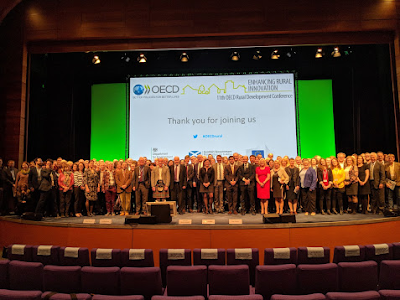This year’s OECD Rural Development Conference took the uplifting theme of “enhancing innovation”, a key to ensuring rural areas can thrive, and a topic that aligns with much of the work CRE colleagues are doing at Newcastle. Ian Merrell, Carmen Hubbard, Sally Shortall and Paul Cowie were at the conference and returned with some reflections on the experience.
Ian said: “I opted for workshops on the theme ‘skills and training in a rural context’ and there were some interesting discussions between industry and academia. People made the point that we should be distinguishing between the kind of life long training you might undertake at the beginning of your career and the reskilling or upskilling during that career, via short term courses. Some sectors are experiencing rapid changes and policies don’t currently account for this.”
Paul was involved in discussions about the need for creativity to spark the innovation that will create more rural jobs and how we can encourage this is in young people. “Innovative ideas are often those that run counter to the prevailing orthodoxy, which raises questions about innovation and how rural education can foster that. How can we give rural children the skills that will enable them to participate fully in the future rural economy however that changes?” he said.
Education also got a mention in the Rural Services Session, in the context of how rural communities can be enabled to access the best services. That may not be within their own communities, unpopular as that message might be. Sally explained: “One example given in the session where I was presenting was access to services in Northern Ireland. Despite being a very small region, with 93% of the population being 30 minutes or less from a settlement of 10,000 – the proxy for full services – the region has still introduced a Rural Needs Act. This was enacted last year and in effect legislates for rural proofing, now called rural needs assessment. This raised questions about the complexity of distinguishing between what is desirable and what is essential; it might be desirable to have a local school in every community, but it is essential that rural children receive the best possible education. We talked about how emotive any erosion of services becomes. It seems as though people fear that losing services represents the erosion of community.”
Neo endogenous development models and the work of CRE were referenced in the discussions about rural development and delegates broadly agreed that both resources and knowledge from outside need to be combined with local know how.
“There were some impressive examples of neo endogenous development from Eigg in the Inner Hebrides to the Arctic Smartness programme in Northern Finland,” said Paul. “They demonstrated how communities were able to build institutional capacity by working with multiple levels of government to develop development strategies which worked with the natural, cultural and human capital within their community.”
Connectivity is important for innovation but do developments always have to be high tech? Carmen was anxious to emphasise the importance of people in entrepreneurship when she spoke about “green jobs”.
“The conference was an excellent opportunity to be involved in the discussions. However, considerable emphasis was placed on technology, smart practices, precision agriculture and the digital economy. We can’t dispute their significance for rural areas, but a more holistic and integrated approach for rural development would be preferable. Technology is not the supreme driving force for economic development and it cannot be applied in isolation. As one of the participants put it ‘You do not need to be smart to be innovative. Innovation means finding solutions to problems’. We need to carefully consider which technologies are required: Innovative technology requires highly skilled operators and less input of labour per unit of output. Highly innovative businesses can grow and create new jobs, but these technologies may destroy jobs in the agricultural sector.”


